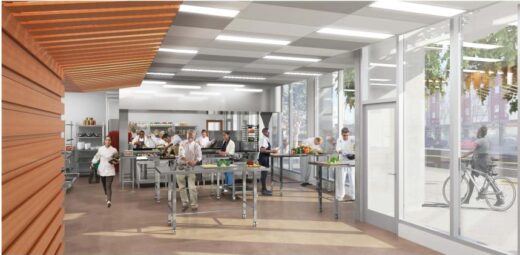
Oct 19CHEFS Get Cooking at 1064 Mission
Walk past Episcopal Community Services of San Francisco’s (ECS’s) Canon Kip Senior Center and you might get a whiff of something delicious. For more than 15 years, ECS has changed lives through their Conquering Homelessness through Employment in Food Services or “CHEFS” program. Participants, primarily people experiencing homelessness, master all the skills necessary to run a commercial kitchen, network with prominent restauranteurs, and earn a stipend while completing the course. As ECS made plans to expand this already-ambitious program, however, the medium-sized kitchen at their current location on Natoma Street started feeling a little cramped.
Now, the CHEFS program will find an expanded, state-of-the-art 6,000 square foot home on the ground floor of ECS and Mercy Housing California’s (MHC’s) co-developed new 1064 Mission Street Permanent Supportive Housing community. ECS, a long-term partner of MHC, will own, operate, and provide services at 1064 Mission.
When plans for 1064 Mission were drawn up, ECS and MHC embraced the opportunity to create an active, community-engaging space facing San Francisco’s busy Mission Street.
“We had an opportunity to build a facility for CHEFS with an adequately sized teaching kitchen, classroom, dishwashing station and storage, and sufficient spaces for teaching staff,” said Sharon Christen, MHC’s Associate Director of Permanent Supportive Housing. “Our role is to work with ECS to finance and build the space, evaluate the design challenges, and work with the contractor to install the espresso machines!”
ECS plans to expand the social enterprise and employment navigation aspects of CHEFS, supporting more participants in landing their first food industry job.
Residents of 1064 Mission will have the opportunity to participate in the CHEFS program, which is also open to the broader community. In addition to CHEFS, 1064 Mission will also house a new 20,000 square foot Homeless Services Center operated by San Francisco’s Department of Homelessness and
Supportive Housing and Department of Public Health, which will provide holistic health and dental care.
When 1064 Mission opens its doors to 256 new residents in 2022, it will also welcome in a new class of future line cooks, chefs, and kitchen managers. As this powerful partnership project shows, home is just the beginning of the opportunities permanent supportive housing can provide.
What’s the deal with Modular Construction?

To fight back against homelessness more efficiently, Mercy Housing California is exploring new ways of shortening construction times. Modular Construction, for example, involves creating each
apartment separately in an indoor facility and then assembling the building unit-by-unit using cranes. This can be faster than using a traditional “stick built” construction process, in which the entire structure is built onsite. UC Berkeley’s Terner Center researched the efficacy of modular construction at our Tahanan permanent supportive housing community in San Francisco, and found that coupled with innovative financing methods, modular cut construction time by about 30% and cost per home by about 25%.
No related posts.
Stay Up To Date
Get news on Mercy Housing and inspiring stories of change delivered to your inbox.


